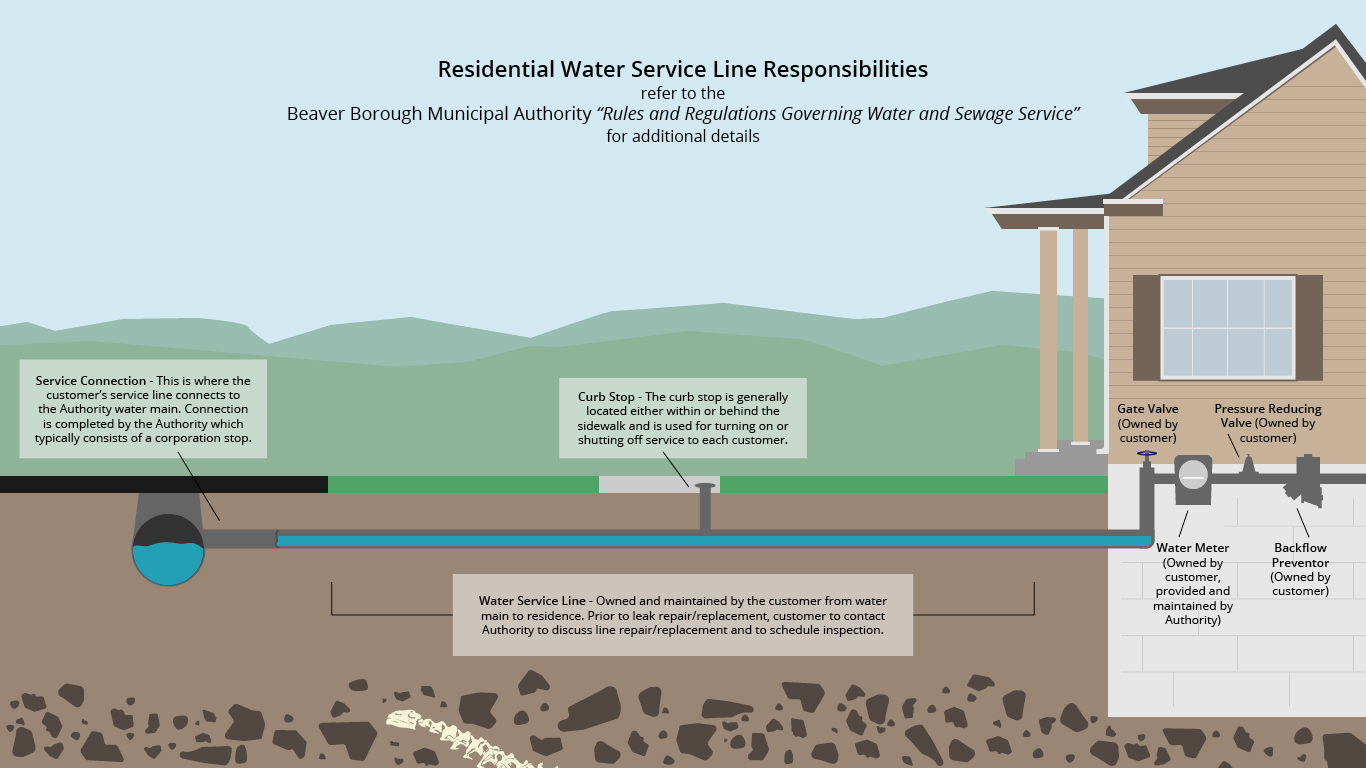
My Bill
Beaver Borough Municipal Authority offers several ways to make sure your monthly bill is paid on time!
Automatic Bill Payment – Set up automatic payments from your checking or savings account by completing the Authorization Agreement for Automatic Payments.
- Saves you the hassle of writing a check and mailing.
- No delay – no late payment.
- The account has to be current with the current amount paid in full.
- Once the completed Authorization Agreement has been received (link is listed below “Sign Up For Automatic Bill Payment”), the payment will be automatically deducted from your account on the 25th of the month.
- It’s that easy!
- You will still receive your monthly bill at the beginning of the month with the amount due. Your bill will read “Auto Draft – DO NOT PAY”.
Sign Up For Automatic Bill Payment
Portal on website – Payment can be made on our website – go to homepage and click on “Pay My Bill” (link is listed below) – this will take you to the “Beaver Boro Municipal Authority ” – click on “Create an account” – you will need your account number and CID# (both are listed on your bill). Payment options are checking account (no fee) or credit card (fees applied).
Bill Payment Service/Electronic Bill Pay – If you are utilizing your bank’s online billing service please verify Beaver Borough Municipal Authority, 469 Third Street, Beaver as the payee and your account number. There may be a delay in your payment or it may be rejected if there is an incorrect account number or payee. Check the payment options for the timeframe of the payment delivery.
Mail – Mail check along with payment stub to Beaver Borough Municipal Authority, 469 Third Street, Beaver, PA 15009.
Drop Box – There is a secure drop box on the left side of the front door to the Borough Building (469 Third Street). Payment can be made by check or cash (along with payment stub). Drop Box is checked daily.
If your bill is higher than you expected, it could be because of factors such as:
- A leaking toilet or a toilet that continues to run after it’s flushed
- A dripping facet
- Watering the lawn
- Additional usage by guests or kids home during school vacations
- Water-cooled air conditioners
- Leakage from a broken pipe or water heater
- Your water softener continuously running
Each month customers call the Municipal Authority after receiving their monthly billing who are surprised at the amount of water they have been billed for because it exceeds their normal usage. Typically it is determined that the increase is due to some form of a leak within the home.
The water meter can be used to determine if you have a leak. Start by making sure that no water is being used in the home. Check the digital readout or the flow indicator on the dial of the meter. If the flow indicator is moving, and no one is using water, you could have a leak and need to perform other checks.
Leaks Inside Your Home
Toilets – The most common reason for a high bill is a toilet leak, because they often go unnoticed, especially those in areas that are seldom used. The leaks are normally caused by a problem with one or more of the following parts: bad flapper valve, flapper valve seat, ballcock valve, float arm or overflow tube. To determine if your toilet is leaking, you can take the following steps:
- Remove the lid from your toilet tank.
- Drop a leak detection strip/food coloring into the tank.
- Wait 10-20 minutes. If the coloring appears in the bowl, your bowl has a silent leak and repairs need to be made. Check more than once. The flapper valve may seat properly some of the time, but not all of the time. This can make this type of water loss difficult to detect.
If you hear water running, it may mean that water is running over the overflow tube in the tank. This too should be fixed.
Faucet Leaks, Sink, Tubs, Showers, Hose Bibs – If your faucet drips or it continues to run after you shut it off it needs to be fixed. Also, check hose bibs and faucets in the garage and unheated areas of your home during winter months.
Softner/Whole House Treatment System
For softeners, the cycling process is regulated by a timer, and is often scheduled for nighttime hours. You likely have a problem in this unit if you constantly hear the sound of running water.
For whole house treatment systems, valves on these units can stick open and cause excessive water use.
Humidifiers – Water accumulating beneath unit could be a sign of a leak. If the overflow unit discharge is piped into a sewer or drainage line, you may not find any visual signs of a leak. If it is a continuous leak, the float may be stuck and could be making a constant sound of water running.
Outdoor Leaks
Faucets and House Bibs – Each outside faucet should be checked for leaks. During the winter months, inside shut off valves should be closed to prevent the outside faucets from leaking.
Customer Owned Water Service Lines and Lawn Sprinklers – Soft spots in your lawn may indicate a break in the underground piping that could be leaking and being absorbed into the ground.

